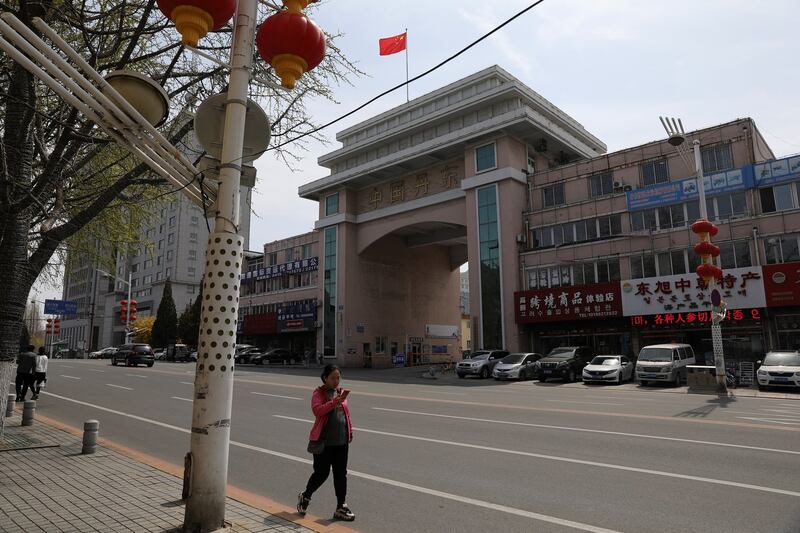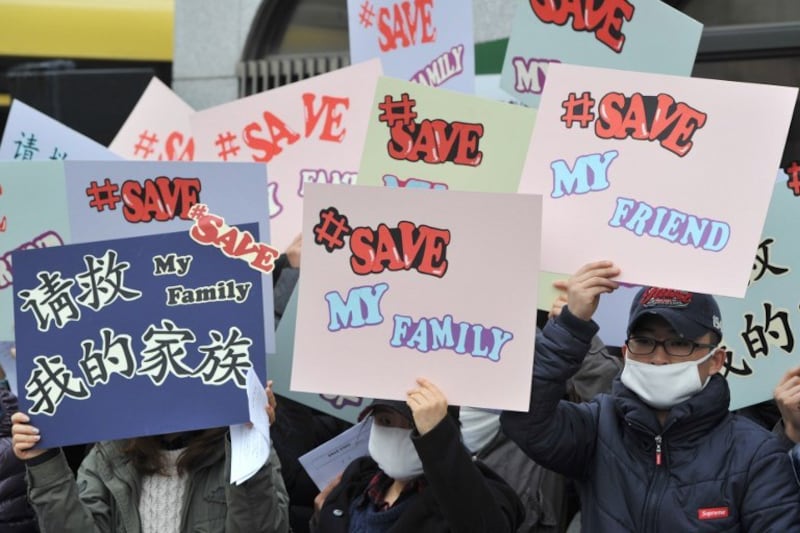The Chinese husband of a North Korean escapee is pleading with authorities daily to show mercy to his detained wife, after hearing that Beijing will soon repatriate more than 1,100 illegal North Koreans, possibly sending them to their deaths, sources in China told RFA.
The husband, an ethnic Korean citizen of China from the border city of Dandong, has been raising his two children on his own since the summer, when Chinese police arrested his wife, a fellow ethnic Korean from Dandong told RFA’s Korean Service.
“He has been losing sleep due to the recent rumors that repatriations will restart soon,” said the source, who requested anonymity to speak freely.
“He married her six years ago after meeting her through an acquaintance. They moved to the city and had two kids and were living in what seemed like their happily ever after,” the source said.
“Now the children weep, eagerly waiting for their mother to return.”
The family in Dandong, across the river from North Korea’s Sinuiju, is just one of many similar cases where Beijing’s forced repatriation of illegal North Koreans will break up families and send women who married Chinese citizens to face hostile punishments in a country that views escapees as traitors.
The detained wives represent only a fraction of the 1,170 North Korean escapees said to be in Chinese custody who could not be repatriated since Beijing and Pyongyang closed their border at the beginning of the coronavirus pandemic in Jan. 2020.
The UN recently published a letter it sent to the Chinese government in August expressing concern about their fate.
“We are concerned that these 1,170 refugees are facing the risk of forcible repatriation in violation of the principle of non-refoulement. We are also particularly concerned that at least two of them are children who require special protection and health attentions from the authorities,” said the letter, signed by three UN officials including the special rapporteur for North Korean human rights, Tomas Ojea Quintana.
The letter noted reports that 50 such refugees were sent back to North Korea in July after spending more than a year in detention in Shenyang.
RFA reported at that time that the 50 North Koreans were loaded onto buses in Dandong and taken across the Yalu River. Sources said many Chinese onlookers showed hostility to the police, warning that they were effectively sending the refugees to their deaths.

The U.N. letter asked Beijing to confirm the 1,170 detentions and explain why the North Koreans were being held. It also asked China to reaffirm that measures were in place to respect their rights as refugees to not be forcibly repatriated to a hostile country.
Punishment awaits
Chinese husbands of North Korean women are terrified across Liaoning and Jilin, the two provinces on China’s side of the 880-mile Sino-Korean border, another Chinese citizen of Korean descent from the city of Changchun told RFA.
“If the North Korean refugees are sent back, they will likely be tortured and executed or sent to a political prison,” said the second source, who requested anonymity for security reasons.
“I recently heard from an acquaintance who works for the Changchun Public Security Department that the North Korean escapees are really causing them a headache… He said it is difficult to do that kind of work because their husbands, their children and other family members come to the department every day, crying and asking for mercy,” the second source said.
One man who heard that his wife was to be the first sent back came to the department demanding to know if the rumors were true, the second source said.
“If these North Koreans are sent back then there will be no greater tragedy for their Chinese husbands and children. When they were arrested, they told their families that they will never come back alive if they are sent back to North Korea.”

Hundreds of thousands of North Koreans fled to China to escape a mid-1990s famine, with about 30,000 making their way to South Korea. As many as 60,000 North Koreans remain in China, despite having no legal status, and some have married Chinese nationals.
RFA reported in August that after a long period of time in which the North Korean spouses of Chinese nationals were treated leniently, despite Beijing’s commitment with Pyongyang to repatriate all illegal North Koreans found within its borders, police are now actively arresting them.
Beijing claims it must return North Koreans found to be illegally within Chinese territory under two bilateral border and immigration pacts.
Rights groups, however, say that forced repatriation is a violation of China’s responsibility to protect the escapees under the UN Refugee Convention.
According to the Department of State’s 2020 Trafficking in Persons Report, there are up to 30,000 unregistered children of North Korean women and Chinese men. The report noted that the children are stateless and vulnerable to exploitation.
Translated by Leejin Jun and Claire Lee for RFA’s Korean Service. Written in English by Eugene Whong.
